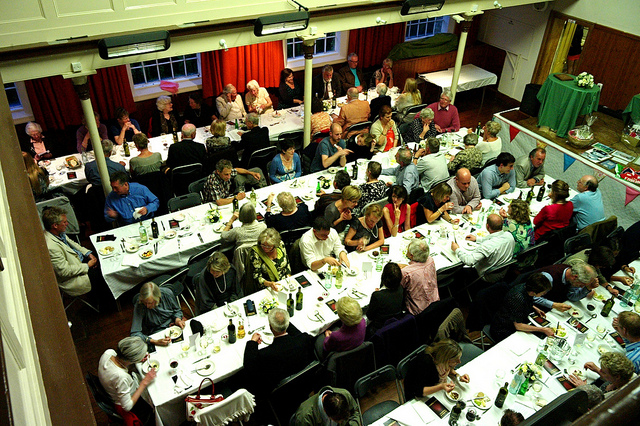No, not a picture of a Jubilee dinner, but of something far more moving and significant. Some months ago, a lovely young man who was a classmate of my daughter at secondary school — a clever, charming, athletic undergraduate — had a terrible accident while on a sporting trip abroad. He fell from an hotel balcony and suffered horrendous head injuries. When they got him to hospital, the medics thought he would die. He was in a coma for weeks, had emergency brain surgery and was eventually flown home to our local hospital where he is beginning to make a slow — but in the circumstances miraculous — recovery. He has a wonderful, supportive family but they’re not rich, and this catastrophe has obviously stretched their resources, so many of us have been wondering how best we can help.
Then two of their closest friends had an idea. Why not organise a “benefit evening”? So they set about it. A dinner in the village hall, cooked by volunteers, with everyone paying a lot more than they would in a restaurant. And an ”auction of promises” afterwards.
So last evening we drove through what VS Pritchett once called ”the most gardened country on earth” to the village hall. It was the kind of beautiful English summer evening that George Orwell (and John Major) would have recognised. The only thing missing was those old maids cycling to Evensong. When we got to the Hall, we were directed efficiently into a field specially set aside for parking. Our stewards were young men — some of whom I recognised from the primary-school gate when I used to meet their parents as I picked up my own children. Then into the Hall, which was packed to the rafters. Long trestle-tables with white linen, glasses and cutlery. Legions of the injured boy’s classmates recruited as waiters and dressed neatly in black trousers and white shirts. Guests of all ages, including many grandparents — and villagers who hadn’t known either the boy or his family but felt moved to put their personal weight behind this gesture of solidarity. Lots of parents I hadn’t met for years. Introductions which went, ”Hello, I’m JP’s Mum. You must be Annie’s Dad”. Teachers from the (terrific) school that so many of our children had attended. And the injured boy’s twin brother.
Then the meal: excellent boeuf bourgignon for the carnivores; and an equally delicious vegetarian option. And lots of dessert, with each table taking its turn to collect it. All in good order and with much cheerful jostling. Afterwards a few short speeches: from the boys’ rugby coach; then the sparky teacher who taught our children English for GCSE; and finally the injured lad’s identical twin.
”Some of you won’t know my brother”, he said, ”but now you do, because usually people cannot tell us apart”. He spoke movingly but without mawkish sentimentality, and left us marvelling at the capacity of human beings to rise above adversity. He and his brother are as close as it possible for two people to be; so in a way part of him was down the road in hospital as he spoke. Listening to him I felt that, for once, Hemingway’s definition of courage as ”grace under pressure” was justified.
And then the auction of promises. People had come up with an amazing array of offerings. Numerous tickets to rugby Internationals (for sums ranging between £120 and £280); a round of golf with the school principal (£120). Tickets to cricket Test Matches. Paintings by local artists. A week in an Alpine chalet (£1200). Another week in a Portuguese villa. A meal for two in a local restaurant (we went to £100 on this and were outbid). A free annual tax return by a local accountant (a snip at £35). And so it went on and on, with the audience being continually amazed — and delighted — by the frenzied bidding.
What fuelled the event was a shared recognition of how fragile is the thread by which life hangs. Here, after all, was a family which had done everything right: brought up two lovely lads who had the world at their feet — boys who turned out to be not only nice people and terrific athletes but also had won places at Oxford. And then — bang! — in one fateful moment, it all disintegrated. They had experienced the terror that lurks at the back of every parent’s mind. There but for the Grace of God and all that…
It was one of the most heart-warming events I’ve ever attended, an affirmation of the power of friendship and human empathy, a reminder — against the horrifying evidence of our capacity for inhumanity that is currently on display in Syria — of the better angels of our nature. And it was all so very English, somehow: no histrionics; no tears; just a quiet, determined pragmatism. As we drove home in the dark I was reminded of why I love living in this country.

